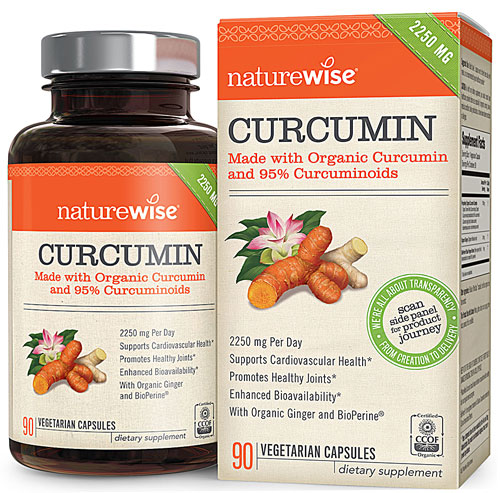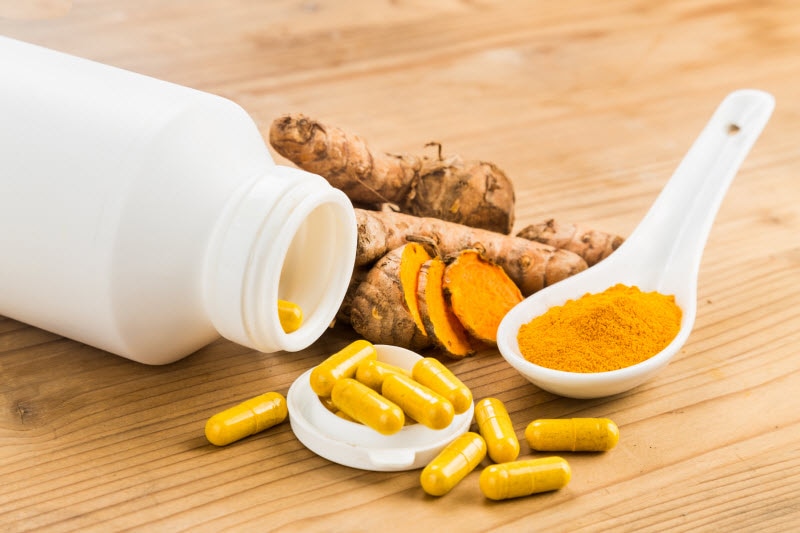Turmeric is oft touted as a medicinal cure-all that can help with everything from join pain to memory conditions. But it might not be for everybody—in fact, turmeric can exacerbate certain health conditions. Does this mean it’s time to kiss the curry goodbye? Not exactly. The amount of curcumin in spicy foods is generally at low enough levels to be safe. But, in light of the following interactions, you might want to reconsider your turmeric supplement.†
What is turmeric?
Turmeric, a bulbous root belonging to the ginger family, is bright yellow and has a pungent, earthy taste. Its potent ability to help maintain a robust inflammatory response, support healthy brain cells, promote liver function and boost antioxidant activity makes it a promising supplement worth incorporating into your healthcare arsenal.†
Studies have linked its active ingredient, curcumin, with relieving pain, supporting healthy blood flow, promoting cellular health, supporting digestion, supporting liver health, promoting brain health and helping with skin wounds.† In broader terms, turmeric's root-like nature acts as a fortifier that brings stimulating energy to the large intestine.† However, despite all of turmeric’s myriad benefits, some of its superpowers may actually be too strong and cause more harm than healing.
The potential side effects of turmeric and curcumin
What’s a safe turmeric dosage?
Typically, studies use doses of 500–2,000 mg of turmeric per day, mostly in the form of a concentrated curcumin extract that is much higher than the amounts naturally occurring in foods. According to Consumer Lab, an organization that tests the quality of supplements, turmeric in powdered spice form contain around 3% curcumin, compared to the 95% curcumin found in extracts.
Turmeric/curcumin supplements are generally considered safe, but there hasn’t been enough research looking at the negative long-term side effects of taking a turmeric or curcumin supplement. A spate of lesser known studies suggests evidence of potentially alarming interactions, as well as a few small studies that suggest short-term side effects.
Who should not take it?
Although turmeric is believed to be benign for most individuals, certain people may have to avoid it. The following conditions warrant extra caution:
Iron deficiency: Turmeric may interfere with iron absorption, so if you are prone to anemia, turmeric may be working against your need for iron. One study found that turmeric, along with chili pepper, garlic, and shallots, reduced iron availability, or the amount of iron your body can absorb, by 20 to 90 percent.
Bleeding disorders: Turmeric may slow the ability of your blood to clot, which can intensify bleeding problems. By the same token, turmeric may also amplify the effects of blood-thinning medications, which can increase your bleeding risk. If you’re currently taking blood thinners (including aspirin), talk to your doctor before taking a turmeric or curcumin supplement.
Diabetes: Turmeric may intensify diabetes medications that lower blood sugar to a dangerous degree. While some research (mostly in animals) suggests that turmeric offer a favorable alternative treatment for diabetes, turmeric may also magnify the effects of diabetes medications, to deleterious effect. Turmeric can enhance diabetes medications that lower blood sugar, thus increasing your risk of low blood sugar. Until more research comes out, it’s best to check in with your healthcare team before taking turmeric supplements for diabetes.
Kidney stones: Turmeric may predispose you to kidney stones. Turmeric is high in oxalate, which in high doses, binds with calcium and leads to kidney stones formation. One study found turmeric supplements significantly inflated levels of oxalate, a chemical the body releases through urine.
Gallbladder disease: Turmeric may cause the gallbladder to contract, exacerbating gallbladder problems. One study found that the dosage of curcumin capable of producing a 50 percent contraction of the bladder was 40 mg.
Bottom line: If you want to take a turmeric supplement, talk to your healthcare team first, especially if you have any of the above conditions.
†These statements have not been approved by the Food and Drug Administration. These products are not intended to diagnose, treat, cure or prevent disease.




